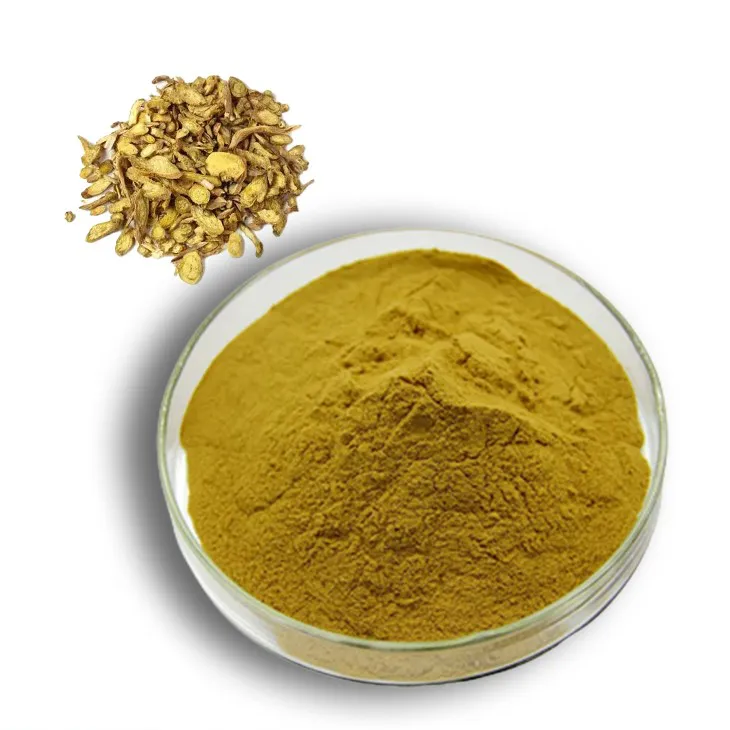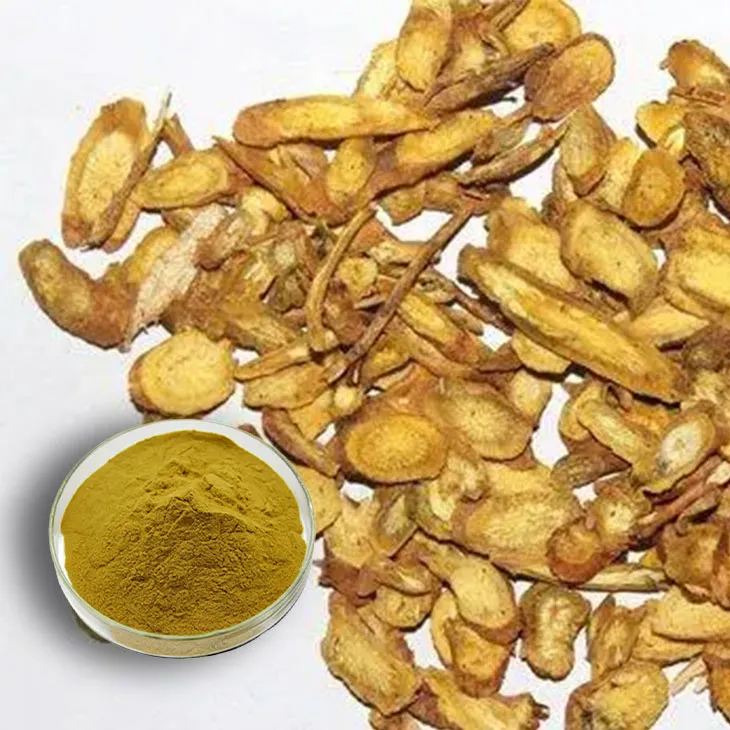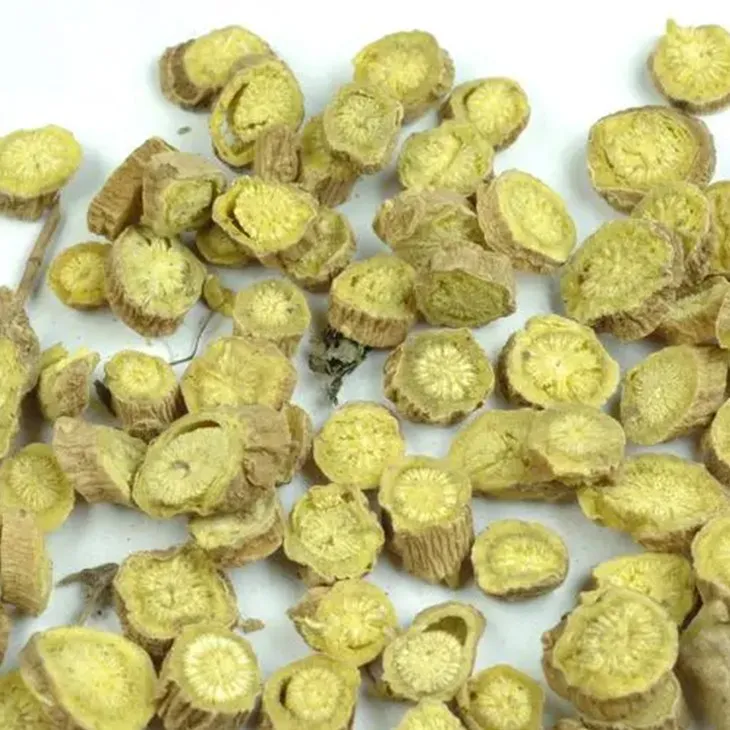- 0086-571-85302990
- sales@greenskybio.com
Use baicalin to prevent diseases and enhance immunity.
2024-11-14

1. Introduction
Baicalin, a flavonoid compound isolated from the roots of Scutellaria baicalensis Georgi, has been the focus of extensive research in recent years. It has shown remarkable potential in the fields of disease prevention and immune system enhancement. The unique chemical structure of Baicalin endows it with a variety of biological activities, which play crucial roles in maintaining human health.

2. Antioxidant Properties of Baicalin
2.1. Reactive Oxygen Species (ROS) Scavenging
One of the most important mechanisms through which baicalin exerts its antioxidant effect is by scavenging reactive oxygen species (ROS). ROS, including superoxide anions (O₂⁻), hydrogen peroxide (H₂O₂), and hydroxyl radicals (·OH), are constantly generated during normal cellular metabolism. However, excessive ROS production can cause oxidative stress, which is associated with various diseases such as cancer, cardiovascular diseases, and neurodegenerative disorders. Baicalin can directly react with ROS and neutralize their harmful effects. It donates electrons to these highly reactive species, thereby preventing them from oxidizing cellular components such as lipids, proteins, and DNA. For example, in vitro studies have shown that baicalin can effectively reduce the levels of H₂O₂ - induced ROS in cells, protecting the cells from oxidative damage.
2.2. Antioxidant Enzyme Regulation
In addition to directly scavenging ROS, baicalin also modulates the activity of antioxidant enzymes. Antioxidant enzymes such as superoxide dismutase (SOD), catalase (CAT), and glutathione peroxidase (GSH -Px) are the body's natural defense mechanisms against oxidative stress. Baicalin can up - regulate the expression and activity of these enzymes. For instance, it has been reported that baicalin treatment can increase the activity of SOD in cells. SOD catalyzes the conversion of O₂⁻ to H₂O₂, which is then further decomposed into water and oxygen by CAT and GSH - Px. By enhancing the activity of these antioxidant enzymes, baicalin helps to maintain the redox balance within cells and tissues, reducing the risk of oxidative - stress - related diseases.
3. Anti - inflammatory Properties of Baicalin
3.1. Inhibition of Inflammatory Mediators
Baicalin exhibits potent anti - inflammatory effects by inhibiting the production and release of inflammatory mediators. Inflammatory mediators such as cytokines (e.g., interleukin - 1β (IL - 1β), interleukin - 6 (IL - 6), and tumor necrosis factor - α (TNF - α)), prostaglandins (PGs), and leukotrienes (LTs) play key roles in the initiation and progression of inflammation. Baicalin can suppress the activation of transcription factors such as nuclear factor - κB (NF - κB), which is a major regulator of the expression of many inflammatory genes. By inhibiting NF - κB activation, baicalin reduces the production of IL - 1β, IL - 6, and TNF - α. In addition, it can also inhibit the activity of cyclooxygenase - 2 (COX - 2), an enzyme involved in the synthesis of PGs, and 5 - lipoxygenase (5 - LOX), which is responsible for LT synthesis.
3.2. Modulation of Immune Cell Function
Baicalin also modulates the function of immune cells during inflammation. Macrophages, for example, are important immune cells that play a dual role in inflammation. They can be activated to produce inflammatory mediators, but also have the ability to phagocytose pathogens and apoptotic cells. Baicalin can regulate macrophage polarization, promoting the shift from a pro - inflammatory M1 phenotype to an anti - inflammatory M2 phenotype. In neutrophils, baicalin can inhibit the excessive release of reactive oxygen species and proteolytic enzymes, which are associated with tissue damage during inflammation. Moreover, baicalin can also affect the function of lymphocytes, modulating the balance between T - helper 1 (Th1) and T - helper 2 (Th2) cells, which is crucial for maintaining immune homeostasis.
4. Modulation of Immune Cells by Baicalin
4.1. Effects on T Cells
T cells are central players in the immune system. Baicalin can influence the development, activation, and function of T cells. It has been shown to enhance the proliferation of T cells in response to antigens. This may be related to its ability to modulate the expression of costimulatory molecules on antigen - presenting cells, which are important for T - cell activation. Additionally, baicalin can regulate the balance between different subsets of T cells. For example, it can promote the differentiation of regulatory T cells (Tregs), which play a key role in suppressing excessive immune responses and maintaining self - tolerance. By increasing the number and function of Tregs, baicalin may help to prevent autoimmune diseases.
4.2. Effects on B Cells
B cells are responsible for antibody production. Baicalin can also affect B - cell function. It has been reported that baicalin can enhance the antibody - secreting ability of B cells in a certain context. This may be beneficial for the body's defense against pathogens. However, excessive activation of B cells can also lead to autoimmune disorders. Baicalin may also play a role in maintaining the proper balance of B - cell activation, preventing over - activation and the subsequent development of autoimmune diseases.
4.3. Effects on Natural Killer (NK) Cells
NK cells are part of the innate immune system and are important for the early defense against viruses and tumor cells. Baicalin can enhance the cytotoxic activity of NK cells. It may do this by increasing the expression of activating receptors on NK cells or by enhancing the secretion of perforin and granzymes, which are molecules involved in the killing of target cells by NK cells. By enhancing NK - cell function, baicalin may contribute to the body's ability to fight against viral infections and cancer.
5. Baicalin in Disease Prevention
5.1. Cancer Prevention
Baicalin's antioxidant and anti - inflammatory properties contribute to its potential in cancer prevention. Oxidative stress and chronic inflammation are two important factors associated with cancer development. By scavenging ROS and inhibiting inflammation, baicalin can reduce DNA damage, which is a crucial step in carcinogenesis. In addition, baicalin has been shown to inhibit the growth and proliferation of cancer cells in vitro and in vivo. It can induce cell cycle arrest and apoptosis in cancer cells through various mechanisms, such as modulating the expression of cell cycle - related proteins and apoptotic regulators. For example, some studies have demonstrated that baicalin can down - regulate the expression of cyclin D1, a protein that promotes cell cycle progression, and up - regulate the expression of Bax, a pro - apoptotic protein, in cancer cells.
5.2. Cardiovascular Disease Prevention
Cardiovascular diseases are the leading cause of death worldwide. Baicalin has potential benefits in preventing cardiovascular diseases. Its antioxidant effects can protect endothelial cells from oxidative damage, which is important for maintaining normal endothelial function. Endothelial dysfunction is an early event in the development of cardiovascular diseases. Baicalin can also reduce inflammation in the vascular wall, inhibiting the adhesion and infiltration of monocytes and macrophages, which are involved in the formation of atherosclerotic plaques. Moreover, baicalin may have beneficial effects on lipid metabolism, such as reducing blood lipid levels, which further contributes to the prevention of cardiovascular diseases.
5.3. Neurodegenerative Disease Prevention
Neurodegenerative diseases, such as Alzheimer's disease and Parkinson's disease, are characterized by the progressive loss of neurons. Oxidative stress and inflammation are also implicated in the pathogenesis of these diseases. Baicalin's antioxidant and anti - inflammatory properties make it a potential candidate for neurodegenerative disease prevention. In pre - clinical studies, baicalin has been shown to protect neurons from oxidative damage and reduce neuroinflammation. It may also modulate the aggregation of amyloid - β peptides in Alzheimer's disease or the aggregation of α - synuclein in Parkinson's disease, which are important pathological features of these diseases.6. Baicalin and Immune System Enhancement
6.1. Strengthening the Innate Immune Response
Baicalin can enhance the innate immune response. It can increase the phagocytic activity of macrophages and neutrophils, which are the first line of defense against pathogens. By enhancing the function of these phagocytic cells, baicalin helps the body to quickly clear invading microorganisms. In addition, baicalin can also stimulate the production of antimicrobial peptides in epithelial cells. These antimicrobial peptides can directly kill pathogens or modulate the immune response, further enhancing the body's innate immunity.
6.2. Boosting the Adaptive Immune Response
Baicalin also plays a role in boosting the adaptive immune response. As mentioned earlier, it can enhance the activation and function of T cells and B cells. This leads to a more efficient immune response against specific antigens, such as those from viruses or bacteria. By promoting the production of antibodies by B cells and the cytotoxic activity of T cells, baicalin helps the body to develop long - lasting immunity against pathogens. This is particularly important in the context of vaccination, where baicalin may potentially enhance the efficacy of vaccines.7. Conclusion
Baicalin, with its antioxidant, anti - inflammatory, and immune - modulating properties, shows great potential in preventing various diseases and enhancing the immune system. Its multiple mechanisms of action at the cellular and molecular levels make it a promising natural compound for future applications in medicine. However, further research is still needed to fully understand its pharmacokinetics, safety, and efficacy in humans, and to develop more effective strategies for its use in disease prevention and treatment.
FAQ:
Q1: What are the main diseases that baicalin can prevent?
Baicalin has shown potential in preventing a range of diseases. It may play a role in preventing infections such as bacterial and viral infections. For example, it may help prevent respiratory tract infections. It also has potential in preventing certain chronic diseases like cardiovascular diseases, as its antioxidant and anti - inflammatory properties can help reduce oxidative stress and inflammation which are often associated with the development of these diseases. Additionally, it may have a role in preventing some autoimmune diseases by modulating the immune system.
Q2: How does baicalin enhance the immune system?
Baicalin enhances the immune system through multiple ways. It can modulate immune cells. For instance, it may affect the function of macrophages, which are important immune cells involved in phagocytosis and antigen presentation. Baicalin can also influence the production of cytokines, which are signaling molecules in the immune system. By regulating the balance of cytokines, it helps in proper immune response. Moreover, its antioxidant and anti - inflammatory properties contribute to a healthy immune environment, as excessive inflammation and oxidative stress can suppress the immune system.
Q3: Are there any side effects of using baicalin for disease prevention?
When used in appropriate doses, baicalin is generally considered safe. However, some people may experience mild side effects such as gastrointestinal discomfort like nausea or diarrhea. High - dose or long - term use may potentially lead to more serious side effects, but more research is needed in this regard. Also, people with certain pre - existing medical conditions or those taking other medications should consult a healthcare provider before using baicalin for disease prevention to avoid potential drug interactions.
Q4: How can baicalin be taken for disease prevention and immune enhancement?
Baicalin can be taken in various forms. It is available in some dietary supplements. However, the appropriate form and dosage may vary depending on individual needs. It can also be consumed through traditional herbal remedies in some cultures where plants containing baicalin are used in herbal preparations. It is important to follow the recommended guidelines on the product labels or consult a healthcare professional to ensure safe and effective use.
Q5: Can baicalin be used alone for disease prevention?
While baicalin shows potential in disease prevention, it may not be sufficient to be used alone in all cases. It can be part of a comprehensive approach to disease prevention. For example, in preventing infections, maintaining good hygiene practices and a healthy lifestyle (such as proper diet, regular exercise) are also important. In the case of chronic disease prevention, other factors like blood pressure control, cholesterol management also play crucial roles. Baicalin can complement these preventive measures by enhancing the immune system and reducing risk factors associated with diseases.
Related literature
- The Antioxidant and Anti - Inflammatory Properties of Baicalin: A Review"
- "Baicalin and Immune Modulation: Current Understanding"
- "Baicalin in Disease Prevention: Clinical and Pre - clinical Evidence"
- ▶ Hesperidin
- ▶ Citrus Bioflavonoids
- ▶ Plant Extract
- ▶ lycopene
- ▶ Diosmin
- ▶ Grape seed extract
- ▶ Sea buckthorn Juice Powder
- ▶ Fruit Juice Powder
- ▶ Hops Extract
- ▶ Artichoke Extract
- ▶ Mushroom extract
- ▶ Astaxanthin
- ▶ Green Tea Extract
- ▶ Curcumin
- ▶ Horse Chestnut Extract
- ▶ Other Product
- ▶ Boswellia Serrata Extract
- ▶ Resveratrol
- ▶ Marigold Extract
- ▶ Grape Leaf Extract
- ▶ New Product
- ▶ Aminolevulinic acid
- ▶ Cranberry Extract
- ▶ Red Yeast Rice
- ▶ Red Wine Extract
-
Diosmin
2024-11-14
-
Saw Palmetto Extract
2024-11-14
-
Curcuma Longa Extract/Turmeric extract
2024-11-14
-
Hawthorn powder
2024-11-14
-
Carrageenan Extract Powder
2024-11-14
-
Hops Extract
2024-11-14
-
Camu Camu Extract
2024-11-14
-
Tongkat Ali Extract
2024-11-14
-
Citrus Aurantii Extract
2024-11-14
-
Pomegranate Extract
2024-11-14





















